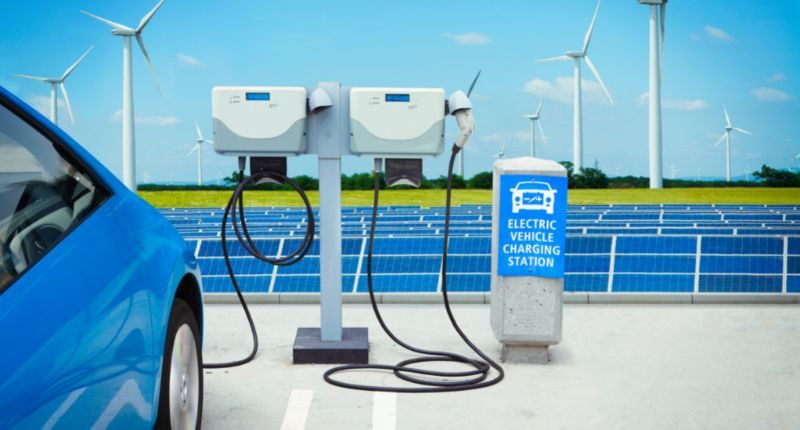- 42% of Aussies have revealed an EV will be their next car, according to Money.com.
- 21% of those who don't want an EV said there are too few charging stations.
- Electric communities will help consumers buck the trend of high energy costs
With the annual purchase rate for electric vehicles set to rise to the hundreds of thousands, the demand for charging station infrastructure, and more clean energy opportunities, is increasing.
42 per cent of Aussies have revealed an electric vehicle (EV) will be their next car purchase, according to a new survey of an independent panel of 1010 Australians, commissioned by leading finance platform Money.com.au.
A third of respondents revealed they will buy an EV when they’re ready to upgrade their existing car, while eight per cent will purchase one before they are ready for an upgrade. Just one per cent already owned an EV.
41 per cent of the respondents who didn’t express an interest in upgrading to an EV revealed high EV prices was a main barrier and 21 per cent because of Australia’s relatively low number of charging stations.
Low EV charger numbers leave holidaymakers miffed
Australia has just over 3000 electric vehicle charging stations (and 6500 petrol stations). While existing stations are widespread, at most there are only one or two outlets per station, which has led to queues of EV owners over the 2022-2023 holiday period.
The NRMA, which manages 55 charging stations across New South Wales, reported a 50% increase in demand during the first week of January. The increase was even higher at the busiest locations in Homebush and Mittagong.
Significant government investment in regional EV infrastructure is the key to ending the wait times.
However, State Governments are planning to roll out more charging stations to close the gap. In NSW alone, the Government plans to roll out more than 500 fast-charging stations to recharge vehicles in a matter of 15 minutes, as opposed to former wait times of up to six hours, while the ACT Government anticipates it will need 600-1000 chargers installed by 2030 to support its renewable energy transition.
The fast track
NSW is investing $39.4 million in the first of three rounds of Fast Charging Grants to co-fund 86 new fast and ultra-fast EV charging stations, each with four to 15 bays.
Each station will contain a minimum of two ultra-fast EV charging bays of 350kW capacity, and two fast charging bays of 175kW, and all stations will be fully powered with renewable energy. Modern EVs will be able to plug in to the stations and charge from 20 per cent to 80 per cent in around 15 minutes.

The successful applicants from this round are Ampol, BP, Evie Networks, Tesla, the NRMA and Zeus Renewables.
All 250 stations will be built over the next 24 months with a mix of highway and inner-city sites, ensuring chargers are no more than 5km apart in metropolitan areas and no more than 100km apart on major roads and highways across NSW.
The second round of co-funding is expected to open towards the end of this year.
Electric vehicle costs to come down
Licenced financial adviser and Money.com.au spokesperson Helen Baker said that electric vehicles are expensive like any new technologies at the start. “However, similar to other products, such as solar panels, while the upfront cost is high, the running cost can be significantly lower.”
As an example, the average monthly cost to run a sedan that travels 20,000 km per year is approximately $393, while an electric vehicle equivalent can cost just $161 to run.
“If State Governments stay on track to remove the purchasing barriers by delivering more charging infrastructure, and if more electric vehicle models enter the market, we will see a stronger take-up over the next few years, particularly on the other side of an anticipated economic downturn.” says Barker.
Electric communities in development
Stockland has started construction on its first all-electric community in Western Australia – Stockland Wildflower – located in Piara Waters, 26 kilometres south of Perth’s CBD.
Wildflower will comprise approximately 370 homes, each including provisions for electric vehicle charging points in every homeowner’s garage.
These homes have the potential to reduce energy costs for residents, while also lessening emissions through improved energy efficiency through the use of electric appliances such as induction cooktops, and offering cool roof options designed to reflect more sunlight and absorb less heat than a standard roof.
Stockland General Manager – WA Communities, Col Dutton, said that Wildflower will encourage Western Australians to embrace sustainable homes. “Plus, households can save money through lower energy costs, especially when coupled with solar panels, insulation, and smarter air conditioning.”
WA’s Minister for the Environment and Climate Action, the Hon. Reece Whitby said it’s important for Australian businesses to take the lead when it comes to developing more energy efficient homes. “A home is the biggest purchase most of us will ever make, and it’s important for owners to know that it’s energy efficient. It helps their hip pocket and the environment.”








